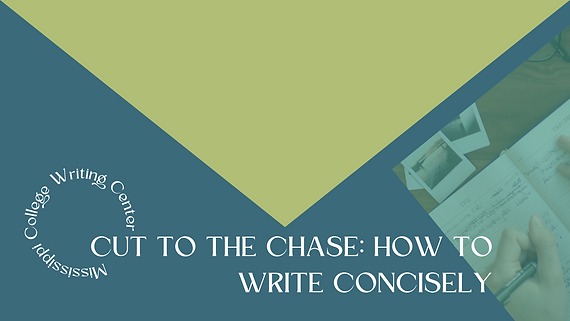Cut to the Chase: How to Write Concisely
by Emma and Mary

Hello everyone!
It's Emma and Mary, back with more writing tips. At the Writing Center, we are huge fans of concise writing -- but it's our tendency as writers to overdo it. We tend to gravitate toward flowery wording to make sure our thoughts come across how we want them to. We also often write stream-of-consciousness for our first (and sometimes last, be honest) drafts. Before we know it, we have a clunky, confusing text on our hands. That's why we're here to show you some practical tips on how to write more concisely!
Why is it important to write concisely? Because when you do, you can convey your ideas clearly. That’s it! By cleaning and condensing your writing, you can make sure that your readers can easily see the point you want to make. It also gives you credibility as an author!
Have you ever found yourself reading an academic article and thinking, Man, this guy needs to cut to the chase? He probably does! Here’s how:
1. Say Goodbye to Softeners!
Softeners kill your claims. Compare these two sentences:
According to the article, it may be possible to draw a conclusion on this topic that the character is defined by being kind and sweet.
The article demonstrates that this character is defined by her kindness.
Softeners are extra phrases or modifiers that make your sentence feel fluffier but don’t add anything to its meaning. In the two pairs of sentences above, one of them may have felt softer as you read it, but when you are making a claim, you do not want to be soft. You are arguing a point, and you want your reader to be able to understand you. Next time you are editing your draft, watch out for phrases like “may be possible” or “I believe that.”
2. Cut Down on Redundancies
Redundancy is one of the biggest obstacles on the path to concise writing. Consider these two sentences:
The author clearly demonstrates that the strong-willed protagonist wants more than anything to achieve her goals by any means necessary, willing to go to great lengths for her convictions.
The author demonstrates that the protagonist is willing to go to great lengths to achieve her goals.
Both of these sentences say the same thing. The only difference is that the first one is jam-packed with redundant information, so it’s harder for readers to digest. We know it’s difficult to meet the word count, but when we’re adding material to our essays, it’s important that everything we include adds something to the overall substance of our essay. Instead of saying the same thing twice, use your space more intentionally; try going deeper on your analysis or bolstering your argument with further evidence.
3. Use Active Voice
In passive voice sentences, the verb in the sentence is made up of a helping verb and a present participle – that is, a verb ending with “ing.” This takes the action off of the verb and puts all of the emphasis onto the helping verb, which is a weak verb structure. Look at these two examples:
By looking at the subject itself, we can see that the text is revealing my point about this topic.
After a dive into the subject itself, the text reveals the issue.
The second sentence, which uses active voice, is clearer and less fluffy. It places the action onto the verbs – the text reveals rather than passively existing and revealing. This leads us into one last point:
4. Strengthen Your Verbs
Stop using ‘is’! While ‘is’ is unavoidable (ha), any time you have a chance to replace it with another verb, do. Your sentence will have a lot more excitement when its verb isn’t just existence!
Let’s examine one last example:
The idea is that the people and their surroundings must exist in a symbiotic relationship despite the years of difficulty in achieving this balance.
The people and their environment thrive in their symbiotic relationship despite the difficulty in achieving this balance.
One last note: the cause of our wordy writing is often our own nervousness. We hide behind redundant phrases, softeners, and passive voice. Don't be afraid to state your claims! When you have research to support your points, you are free to make strong claims.
These are just a few tips on writing concisely -- and fearlessly! We hope they were helpful. This will be one of our last regular blog posts for the semester. Thanks for tagging along, and stay tuned for more fun end-of-the-semester content!
Until next time,
Mary and Emma


